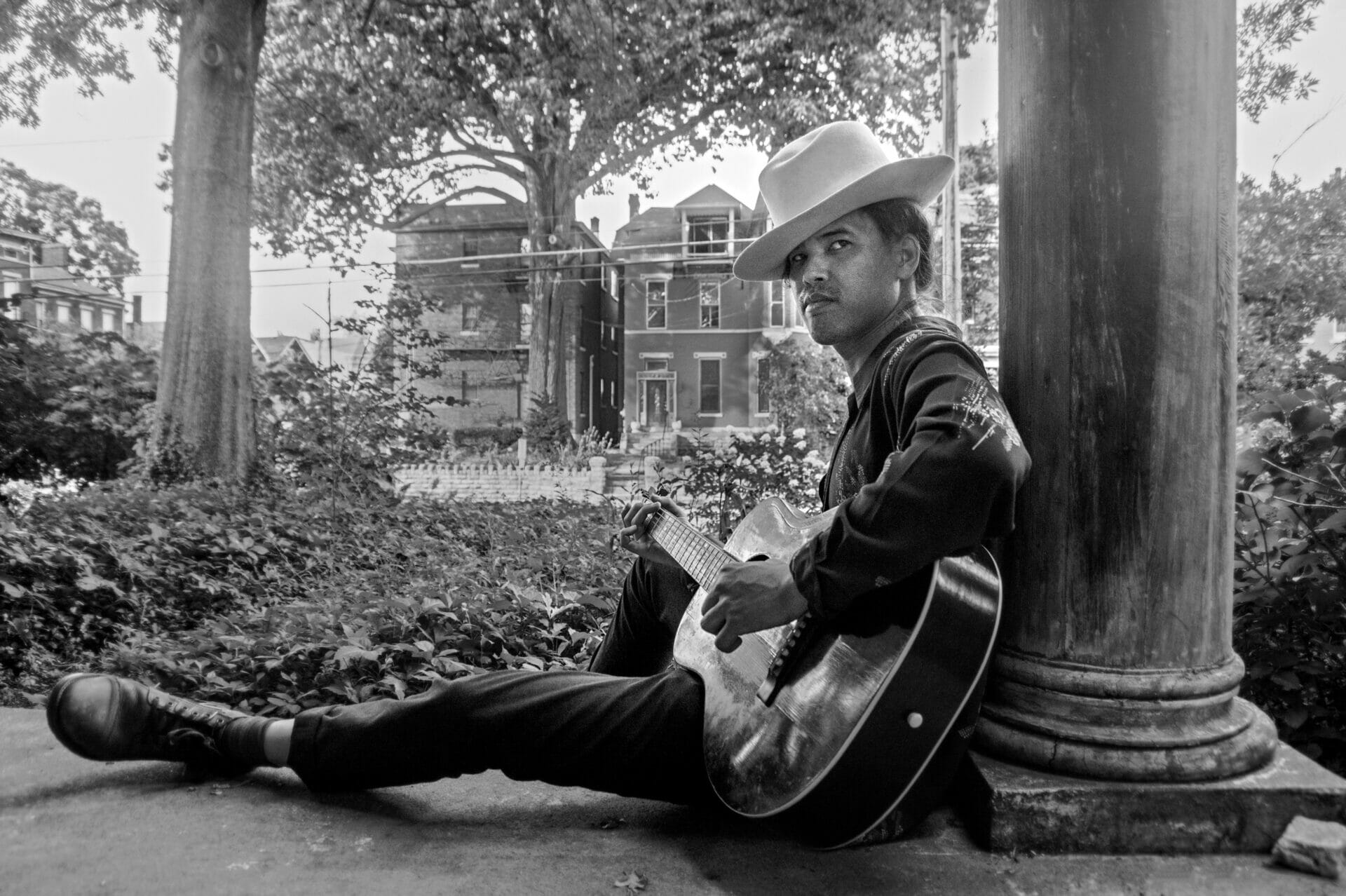Blues Route: Nat Myers

Photo: Jim Herrington
***
In the realm of blues music, where heartfelt stories are etched into each note and soulful melodies resonate with audiences, Korean-American blues poet Nat Myers has emerged as a fresh and powerful voice. He’s calling from Kentucky shortly before the release of his new LP, Yellow Peril. His cadence, drenched in a Southern drawl, steadily describes his journey. “The muses ain’t segregated none,” he shares. “There’s a lot of crossover, particularly when it comes to me. I might’ve come from a misguided kind of admiration for a particular songsters in the early 20th century and their ability to occupy this Melvillian sense of what the American catalog is.”
Myers’ journey began in Kansas before taking him to West Tennessee and Northern Kentucky. Even as a child, his spirit pushed him beyond the conventional. While others pursued musical instruments in the school band, Myers rebelled, finding solace in skateboarding, pop-punk and hardcore music. However, he did find himself drawn to poetry and—during his eventual studies at New York’s New School—began connecting that art form to the blues. He cites the works of poets like John Berryman and musical pioneers such as Papa Charlie Jackson and Memphis Minnie all within the same breath.
“Being able to show somebody what my take is on a song like ‘Pick Poor Robin Clean’ is refreshing because not a lot of people listen to Geeshie Wiley or Elvie Thomas,” Myers muses. “So it’s like, ‘This is my bad take on what I’m hearing on a record from a hundred years ago. It’s cool to be able to bring someone into self-actualization on a guitar.” He continues without pause: “John Berryman, the poet, just talks about how some things can be so traumatic and strange that you can almost only approach them on the sideways, trying to figure out ways to map that. But the same thing happens when it comes to talking about the blues and learning about it because it ain’t some ancient thing. It’s still really fucking cool. In my opinion, it’s some of the punkest shit you can be doing right now.”
Myers quickly found himself drawn to the streets of New York, where he began busking. “I’ve only ever been interested in playing 7ths,” Myers admits. “If you are playing 12ths or 16ths or a fucking 5-bar, it’s hard for me to pay attention to it. It’s just my natural tendency. There’s something about the blues, particularly the old country blues—this self-reliance in the eagle’s eye—that kinda strikes the innermost part of me.”
However, the outbreak of COVID-19 abruptly halted Myers’ street performances. Despite this, he continued working on music, eventually finding solace in Canton, Ohio, where the guitarist continued performing both virtually and even outside—capturing the attention of Ohio native and Black Keys singer/guitarist Dan Auerbach, who is also the founder of Easy Eye Sound Records.
The encounter with Auerbach marked a turning point in Myers’ musical journey. They connected over their shared love for the blues and the impact of music on American culture. Collaborating with Auerbach, renowned songwriter Pat McLaughlin and blues legend Alvin Youngblood Hart, Myers ventured to Nashville to record Yellow Peril. Eschewing a traditional setting, they set up a makeshift studio in Auerbach’s century-old stone house. Myers describes the recording process as just a bunch of “good hangs” that captured the essence of his brand of folk blues while preserving a touch of American history in each note. Myers has nothing but kindness to share about his recording experience, calling each of those who assisted on the LP a “good friend.” Of Youngblood, he offers, “If anybody asks me about Alvin and they don’t know him, I say, ‘He’s tall as a mountain, wide as a mountain, sings like a mountain.’”
“Yellow Peril,” the centerpiece of the album, carries a significant and unflinching message that reverberates in today’s world. Written during the pandemic, just before the Stop Asian Hate movement gained momentum, the song reflects Myers’ own experiences, as well as the racial tensions many Asian Americans currently face. Through his music’s droning sound, intensified tempo and howling chorus, Myers aims to provoke thought and raise awareness. It is something the originators of blues also did, though Myers recognizes his space in the annals of the genre’s long and tattered history—and makes no attempt to compare himself to the genre’s originators.
While steeped in poetry and old 78s, Yellow Peril still maintains a contemporary resonance. In fact, the album not only deepened Myers’ connection to his heritage but also prompted him to embrace his identity as a Korean American. He reflects on some sage advice his brother imparted to him years before that informed the new album: “He started talking about getting bullied in school, and he was like, ‘If anybody fucks with you for being Korean, grab ‘em by the balls.’
“With the amount of chaos just generally in today’s conversation, the American blues songsters are very important to that tale. When it comes to this album, I call it scraping a little gold off the nugget,” Myers continues. “Sometimes it feels like fool’s gold, but my admiration for the old players—the exquisite syncopation that some of those fellas are able to squeeze out of a guitar—that’s what I aspire to play.”




















